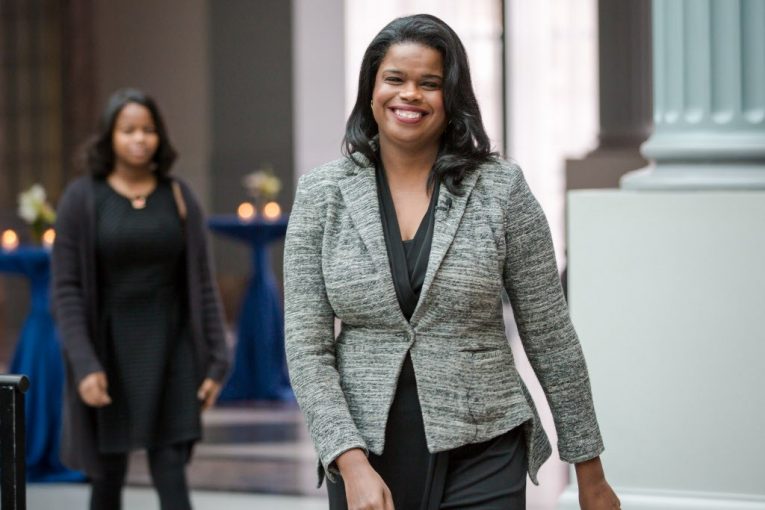

By Anika Khubchandani and Danae Snell
CHICAGO — Born and raised in Cabrini Green, a neighborhood on the northside of Chicago, Kimberly M. Foxx saw “the impact of crime, violence, and poverty” growing up in her community, inspiring her to pursue a career in public service.
Foxx was primarily raised by her mother and grandmother, who taught her to “always fight for what you believe in.”
So, her passion for public service and ambition to create a “fair and equitable criminal justice system” has led her to become the first African American woman to serve as
Cook County State’s Attorney.
In 2016, Foxx defeated two term incumbent Anita Alvarez who faced criticism on her handling of the case involving 17-year-old Laquan McDonald. McDonald was shot 16 times by Chicago Police Officer Jason Van Dyke, who eventually was only sentenced to 6 and three-quarter years in prison.
The grotesque murder of McDonald sparked protests across the city with many activist groups flooding “social media with the #ByeAnita hashtag and placing signs throughout the city which read “blood on the ballot” and “adios Anita 16 shots and a cover up.”
The Chicago community, tired of injustice and oppression, elected Foxx in hope for change in leadership focused on justice and reform.
Since the beginning of her service, Foxx has tackled criminal justice reform and, she said, “bring equity and fairness to a system that, for too long, has disenfranchised low-income people and communities of color.”
Cook County, the second largest prosecutor’s office in the country, has recently earned the reputation of being the “false confession” capital of the U.S.
This has led to Foxx’s action to exonerate those that have been wrongfully convicted – in the last three years, Foxx and her office have “worked to exonerate wrongful convictions of 80 individuals.”
One way Foxx has attempted to address the issue of overcrowding in prisons is by changing the prosecutorial process of traffic offenses.
The policy Foxx is pushing for is for the State’s Attorney’s Office “to not prosecute people accused of driving on licenses that have been suspended or revoked for financial reasons.” She no longer wants to criminalize people’s inability to afford to pay traffic fines.
However, this policy does not change the way her office will review and prosecute cases involving higher crimes “such as DUIs, fleeing a police officer and reckless homicide,” she maintains.
In addition, Foxx also addresses overcrowding in jails by prioritizing the detainment of criminals convicted of more serious crimes. She focuses on individuals who have been too harshly prosecuted with marijuana offenses.
Since being prosecuted for a marijuana offense creates “a scarlet letter” in addition to a criminal record “for too many people to wear,” she said, Foxx has instead increased the number of people directed to diversion programs — “such as mental health treatment and substance abuse services.”
The issue of being prosecuted for lesser crimes is extremely personal to Foxx because as a child she saw her mother smoke marijuana.
“While that may not be behavior that I appreciated,…I knew she wasn’t a criminal,” Foxx shared. “She was always a good mom…and someone who was trying to instill good values into me.”
Even though Foxx’s mother was never convicted of marijuana charges, Foxx has seen first-hand the life trajectory of members of her community change due to marijuana possession convictions.
Since Illinois is currently taking steps to legalize recreational marijuana, Foxx and her office have decided to take a step further by expunging marijuana convictions to work towards “social equity as some people set up to make huge profits from the same substance others were prosecuted for.”
The 80s “war on drugs” has left many with non-violent convictions unable to obtain any work and provide for themselves or their families. Although marijuana has now been legalized in many states and localities, the casualties of that “war” would just be left behind without Foxx’s reforms.
“Righting the wrongs of the failed war on drugs that disproportionately harmed communities of color” is a demonstration of Foxx’s “values and commitment to justice for all,” she argues.
Another huge part of Foxx’s reform efforts is to get the public involved and informed.
She is currently the first and only prosecutor throughout the U.S. to make felony case-level data easily accessible to the public. By creating an open data portal, the State’s Attorney’s Office “provides unprecedented access and transparency into the work of a prosecutor’s office.”
Foxx said she is proud of the work her office has done because statistics show a reduction of violent crime and incarceration rates as well as an increase in safety in Chicago communities.
However, her quest of taking on violent crime, righting the wrongs on the war of drugs, and tackling criminal justice reform does not end here, she insists, promising “to fight for a system that works for everyone” that is aimed at justice and safety not only law and order.
 Anika Khubchandani is a 4th year student at UC Davis majoring in both political science and economics.
Anika Khubchandani is a 4th year student at UC Davis majoring in both political science and economics.  She is from San Jose, CA.
She is from San Jose, CA.
Danae Snell is a senior at Sacramento State majoring in Criminal Justice and is from Salinas, California.
To sign up for our new newsletter – Everyday Injustice – https://tinyurl.com/yyultcf9
Support our work – to become a sustaining at $5 – $10- $25 per month hit the link:
Interesting that in this fairly long article about Kim Foxx the name Jussie Smollett never came up.
https://www.chicagotribune.com/columns/john-kass/ct-met-jussie-smollett-kim-foxx-kass-20190314-story.html